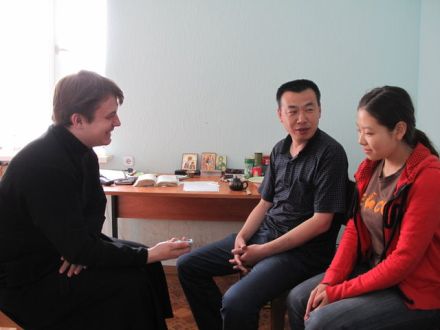Translated by Kira Stebunova
Edited by Isaac (Gerald) Herrin
In November 2008 Vasily Romanov, an Orthodox Christian Chinese from Harbin, was directed to the Belgorod Orthodox Theological Seminary. The aim of his coming consisted in studying Orthodox Christian culture and the Russian language. From the very beginning Vasily gained the affection of many pupils. In the evenings, a small company used to gather in his room in a Chinese tea-meeting. Because Vasily actually could not speak Russian, we had to use a Chinese-Russian dictionary and some basic Chinese phrases such as “hao” – “good” and “buhao” – “bad”. But in spite of this limitation, we understood each other perfectly well. Because Vasily was a medical worker, often he shared with us his Chinese medical primer either with the help of the dictionary or with the help of an interpreter. Sometimes we got together to sing songs to the guitar. Vasily is a great singer. “Podmoskovnye vechera” (a Russian song) in Chinese have won much popularity among the seminarians. The main thing about Vasily is that it’s impossible to feel sad in his presence. He became a perfect example for us. Looking at this person, you assure yourself once again of the remarkable strength of Christian love which conquers all things.
It was very interesting to learn from Vasily some facts of his life and some information about Orthodoxy in China, and we are grateful to the Chinese student of the Belgorod University Zhang Yang for her help in this.

– Vasily, how did you come to the Church?
– I was born in an Orthodox Christian family. My grandfather was a priest. In July 2008 I came to Hong Kong where I was baptized by father Dionisiy Pozdnyaev.
– Tell us, please, why you were directed to us and who directed you.
– I came here by the advice of Fr. Dionisiy. My family belongs to the lineage of Albazinians and for a long time has been connected with Orthodoxy. It was very hard time for my relatives when there was no Orthodox Christian church in China but nevertheless they stayed by their faith. I want to pass our Orthodox traditions down to new generations. The mission of Orthodoxy is very generous and kind. I came to Russia to carry the Christian idea of love which gives to the people care for one another, and here I managed to get everything that I needed for this. The main reason is the respect for the mission my forefathers did. I want to be a continuer of this.
– Vasily, how do you relate Orthodoxy and Chinese culture?
– Orthodoxy and Chinese culture have an idea in common; it is to love everything. Confucianism influenced our culture very much. Confucius is honored by the Chinese as divine being. His famous words are, “Don’t make other people do things you don’t want to do yourself”. Or, “A generous person loves everybody”. This idea of love we can see in Orthodoxy, too. This idea teaches us to love the others, to help them. But there is a big difference between these two cultures. The Chinese do not concentrate on the prayer and spiritual experience so much like the Orthodox do. They are more facile. We have such a saying, “A generous person should perform exploits in order to be an example to the others”. This means we should do a lot for the society during our short life. Although today Orthodoxy empathizes love and to help other people, it pays too much attention to one’s interior life. In my mind, today the Orthodox should extensively preach the Word of Lord and work more for the public good.
– Tell us, please, about your plans for the future.
While on summer vacation I plan to discuss the question of Orthodoxy with the Chinese government, because there is no official decision concerning that more believers would come to Russia for studying Orthodox culture and Russian language. I plan to discuss questions concerning planting an Orthodox Church in China and sending Christian students to Russia for an education. Nowadays the Chinese government favors Orthodoxy because the law protects any religion which constructively influences life of society. It was not like this before. Moreover, we have known some Orthodox missions which have made bad impression. Nowadays there is much room for missionary work in China but there are precious few doers.
– Vasily, what impression did our Seminary make on you?
Seminary made a very good impression on me. This is the first time I have been in Russia. At first everything seemed strange for me but within the walls of the seminary there is such an atmosphere that it helped me to get accustomed. Seminarians are so amiable to me and always ready to help, and I bless them for this.















